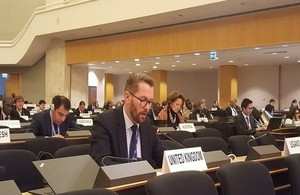UNHCR 69th Session of the Executive Committee: UK Statement
This UK statement was delivered at the 69th session of the UNHCR Executive Committee.

UNHCR 69th Session of the Executive Committee takes place in Geneva.
Thank you Chair. Deputy High Commissioner, distinguished delegates.
The UK aligns itself with the statement made by the EU on behalf of the EU and its Member States.
The challenges facing UNHCR are immense. The numbers of displaced persons continue to grow and while lasting political solutions in fragile and complex environments are imperative, the challenges realising such solutions remain. The UK pays tribute to UNHCR staff who dedicate themselves to protect and assist refugees and other displaced people in some of these most difficult environments.
As a generous, outward facing nation, the UK will continue to be one of the leading donors to the humanitarian system and one of the most steadfast supporters of refugees.
The UK has provided £129 million to the Rohingya response since August 2017; earlier this year, at the Brussels Conference, we pledged £450 million to Syria and the Region. And in countries such as Ethiopia, Kenya and Uganda, we have continued to invest in programmes that benefit both refugees and the host communities as they have rolled out the CRRF.
The UK continues to be a generous resettlement country. As part of a commitment made in 2015 to resettle 20,000 vulnerable refugees affected by the Syria conflict by 2020, over 12,800 refugees have now found safety in the UK to rebuild their lives.
As a 0.7 donor, the UK continues to provide UNHCR and other trusted UN partners with multi-year, core, unearmarked funding. We expect UNHCR to uphold the highest standards of transparency in reporting and to fully implement the controls at the field level which ensure appropriate financial and risk management of the UK taxpayers’ contribution.
The UK would like to highlight three particular areas where we wish to work with UNHCR and others.
First, Chair, it is essential we improve safeguarding standards across the aid sector – ensuring that all those engaged in poverty reduction take all reasonable steps to prevent harm, particularly from sexual exploitation and abuse and sexual harassment, and to respond appropriately when harm or allegations occur.
The UK will host an International Summit on tackling sexual exploitation and abuse and sexual harassment on the 18th of October. We want representatives from across the sector to come to the Summit with clear commitments setting out how they will contribute to achieving four strategic shifts:
- To support survivors and victims, enhance accountability and transparency, strengthen reporting and tackle impunity
- To incentivise cultural change.
- To agree minimum standards. And
- To strengthen organisational capacity and capability of all to meet the minimum standards.
The UK commends High Commissioner and Deputy High Commissioner for your actions thus far. We must continue to drive further progress and challenge the cultures that have allowed this sort of behaviour to occur.
Second, the UK commends UNHCR’s efforts this year to reach consensus on the text of the Global Compact. At its heart, the Compact is setting a new direction for UNHCR and the international community in responding to displacement crises. The hard work must start now, ahead of the first Ministerial Forum next year. We hope, as the High Commissioner noted in his opening statement, that the Compact will be fully endorsed through the UNHCR Omnibus Resolution by the General Assembly. We also urge Member States to step up to the ambition set out in the Global Compact for Refugees as it is implemented. We very much welcome the leadership shown by the World Bank on this.
At the same time, application of the Compact will require an operational shift. Increasingly, UNHCR will need to play the role of convenor and coordinator, not looking to do itself, but to ensure the right people are around the table and playing to their respective strengths. This won’t be easy, and it won’t be immediate. UNHCR must continue to recruit the right staff that can facilitate others; it must look at its systems to ensure that they support multi-year planning; and it must redouble efforts to build political will behind the Compact approach.
Third, On the Grand Bargain, it is essential that we collectively re-focus efforts on delivery at the field level.
We want to see UNHCR collaborate further with partners on the ground, particularly through impartial Joint Needs Assessments which focus on people’s needs and not Agency mandates.
We also want to see increased accountability to beneficiaries and to continue the scale up the use of single, multipurpose cash transfers via a single card where appropriate.
To conclude Chair, the UK looks to UNHCR to continue to play an essential role in ensuring that the most vulnerable and at-risk refugees and IDPs are afforded the protection and provided the assistance they so desperately need.
Like others, we reaffirm our position that UNHCR is the only Agency that can determine when it is possible for refugees to return voluntarily, in safety and dignity. A prerequisite for this is ensuring UNHCR has access to determine whether the conditions allow and to support returns.
Chair, the challenges facing UNHCR will continue next year. UNHCR must continue to reform, to build on the Change Management Process and HR Review to deliver on the ambitions of the Global Compact to achieve lasting durable solutions for those most in need. The UK will be with UNHCR all the way.
Thank you.